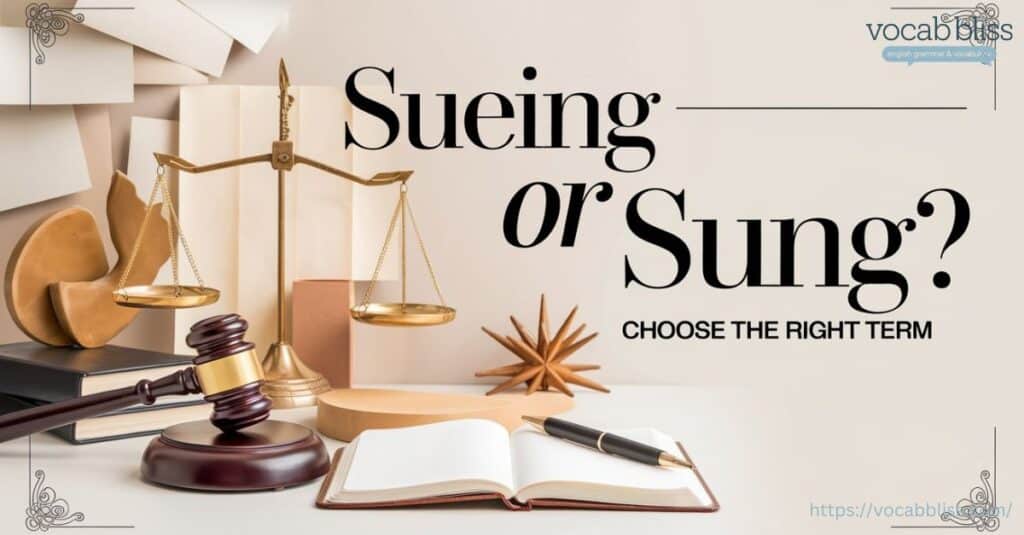Misspelling a word, especially in contexts as crucial as legal terminology, can have significant consequences. Among the common errors is the confusion between “sueing or suing.” While they may seem similar at a glance, only one is correct in English usage.
Let’s delve deep into their meanings, the rules behind their usage, and why this distinction matters in both professional and everyday settings.
Quick Summary
When deciding between “suing or sueing,” the correct choice is always “suing.” The word “sueing” is a misspelling that doesn’t follow English grammar rules. The silent “e” in “sue” is dropped when adding “-ing,” making “suing” the proper form. This term refers to the act of filing a legal case or lawsuit, commonly used in court settings. Knowing the difference is essential for clear communication, especially in formal or professional writing. Avoiding errors like “sueing” ensures your language remains accurate and credible.
Continue reading: Feal vs Feel: Which One Should You Use?
What Does “Suing” Mean?
Definition of Suing
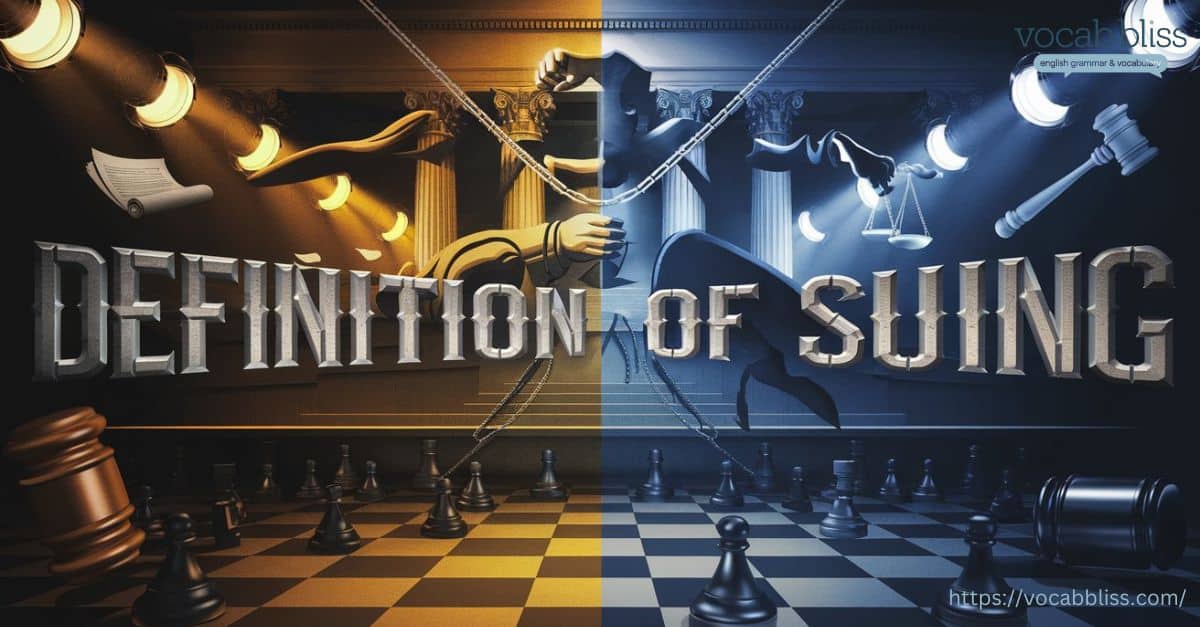
“Suing” refers to the act of initiating a legal case or filing a lawsuit against an individual, organization, or entity. This term is deeply rooted in the judicial system and is used to describe a plaintiff’s action in seeking legal remedy for a grievance.
Example:
- “She is suing the company for breach of contract.”
- “After the incident, the plaintiff considered suing for damages.”
Synonyms for Suing
When discussing legal matters, synonyms can enrich the conversation. Some alternatives include:
- Litigating
- Taking legal action
- Pressing charges
- Filing a lawsuit
Why “Sueing” Is Incorrect
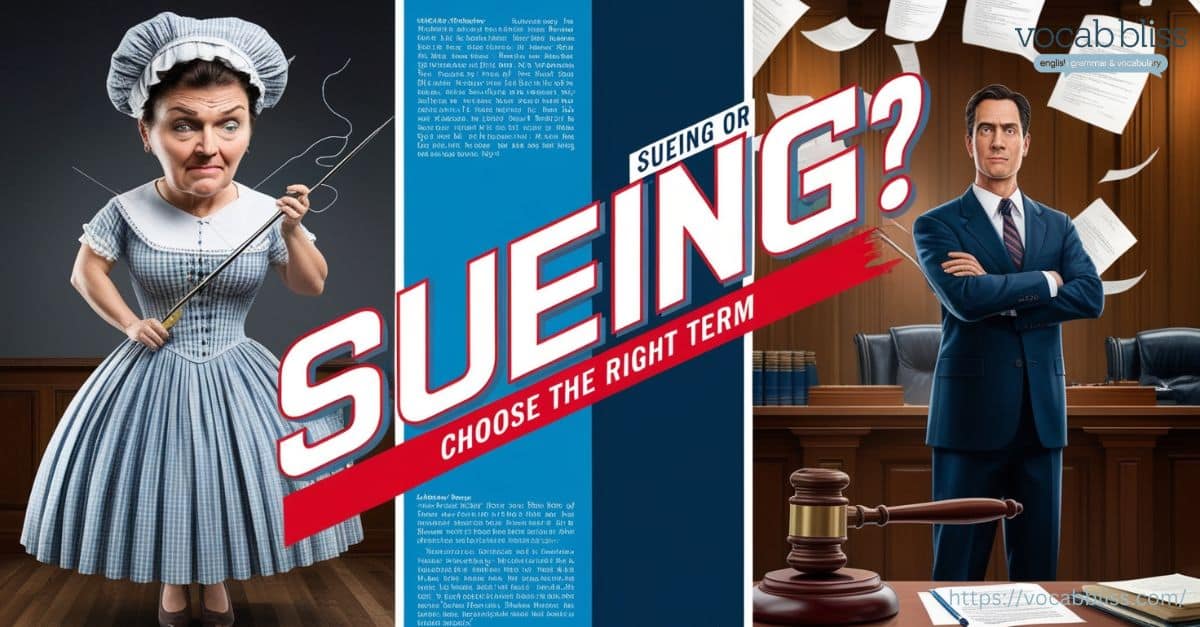
Common Misspellings in English
The word “sueing” appears incorrect due to well-established English spelling rules, specifically the silent “e” rule. In English, when forming the present participle (adding “-ing”) of verbs ending in a silent “e,” the “e” is typically dropped. This simplifies the word structure and ensures natural pronunciation.
For example:
- Base Word: “sue”
- Correct Form: “suing” (silent “e” is dropped)
- Incorrect Form: “sueing” (retaining the silent “e” is unnecessary and grammatically incorrect)
Why the Rule Exists
The silent “e” rule prevents awkward combinations of letters that might make words harder to read or pronounce. By dropping the “e,” English spelling maintains consistency and readability.
Similar Examples:
- Write → Writing (not “writeing”)
- Make → Making (not “makeing”)
- Hope → Hoping (not “hopeing”)
The error arises because “sue” ends with a vowel sound, and some assume retaining the “e” ensures clarity. However, this is a misconception. The correct form “suing” is clear and adheres to standard grammar rules.
Examples of Misspellings in Context
Misspelling “sueing” instead of “suing” is surprisingly common, especially in casual writing or by non-native speakers. Let’s examine how this error appears in sentences:
Incorrect Usage:
- “The plaintiff is sueing the defendant for damages.”
- “After the dispute, they considered sueing the company for breach of contract.”
- “Her lawyer advised her about sueing for compensation.”
Correct Usage:
- “The plaintiff is suing the defendant for damages.”
- “After the dispute, they considered suing the company for breach of contract.”
- “Her lawyer advised her about suing for compensation.”
Impact of Incorrect Usage
Using “sueing” instead of “suing” may cause confusion, reduce credibility in formal documents, or distract readers in professional settings. For example, in legal contexts, where precision is critical, such errors can undermine the writer’s authority or professionalism.
By understanding and applying the silent “e” rule, writers can avoid this common pitfall and ensure their work adheres to proper English grammar standards.
Grammar Rules Behind “Suing”
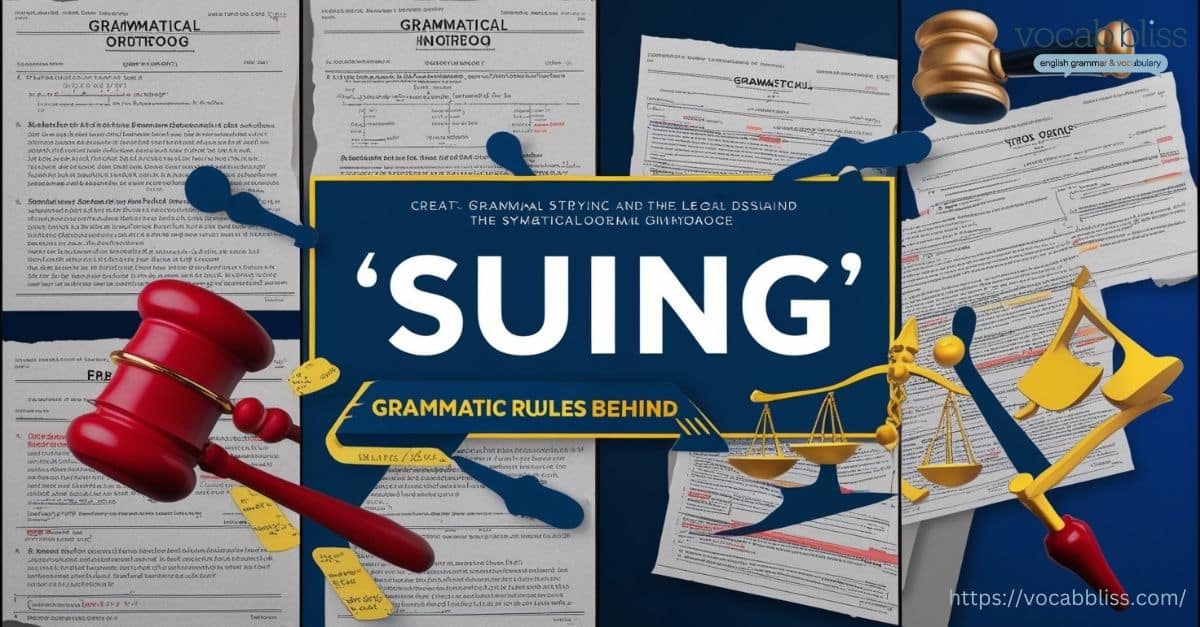
Spelling in English follows predictable patterns, though exceptions exist. For verbs like “sue,” removing the “e” before adding “-ing” ensures the word flows naturally. Let’s compare:
| Base Word | Correct Form | Incorrect Form |
|---|---|---|
| Sue | Suing | Sueing |
| Write | Writing | Writeing |
| Argue | Arguing | Argueing |
These rules not only apply to “sue” but also to numerous other verbs, helping you avoid similar mistakes in the future.
Side-by-Side Comparison of “Sueing or Suing”
Here’s a quick glance at the differences between these two terms suing or sueing:
| Aspect | Suing | Sueing |
|---|---|---|
| Correctness | Correct | Incorrect |
| Definition | Filing a legal action | Not a valid word |
| Grammar Rule | Drop silent “e” + “-ing” | Retains “e” improperly |
| Example Usage | “He is suing the firm.” | N/A |
Why Does It Matter?
How do you spell suing in legal documents or communication can lead to:
- Loss of Credibility: Mistakes undermine professionalism, especially in legal contexts.
- Miscommunication: Incorrect terminology may confuse readers or disrupt formal processes.
- Legal Ramifications: Precision in language is critical for contracts, complaints, and legal filings.
Case Study: A Real-Life Example
In 2019, a legal professional misspelled “suing or sueing” in a high-profile court filing. The typo led to delays in processing the document, causing embarrassment and unnecessary scrutiny from peers.
Key Takeaway: Always proofread, especially when using complex terms like “legal terminology.”
Everyday Usage Examples
To clarify proper usage, here are examples contrasting correct and incorrect forms of Suing or Suing
Correct:
- “The tenant is suing the landlord for unfair eviction.”
- “After the accident, the driver began suing the negligent party for damages.”
Incorrect:
- “The tenant is sueing the landlord for unfair eviction.”
- “After the accident, the driver began sueing the negligent party for damages.”
Featured Misspellings and Related Terms
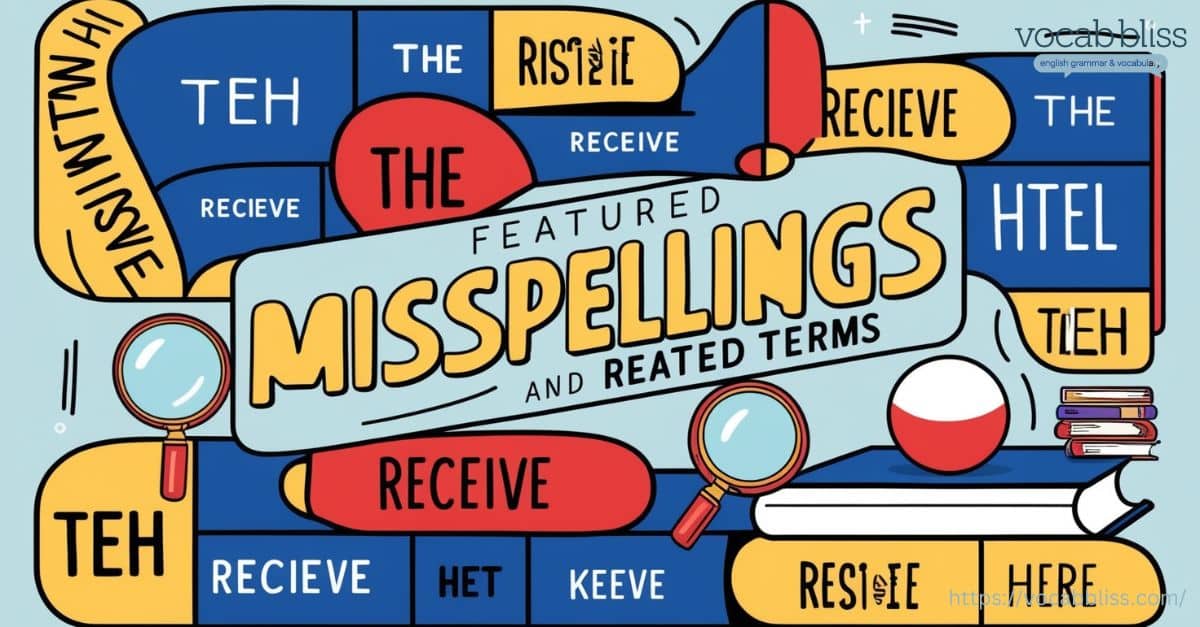
Other Common Misspellings
Similar spelling mistakes often occur in words where the silent “e” rule applies. Examples include:
- Argue → Arguing → Argueing (Incorrect)
- Write → Writing → Writeing (Incorrect)
- Hope → Hoping → Hopeing (Incorrect)
Related Legal Terms
In legal contexts, you may encounter these terms:
- Plaintiff: The party initiating the lawsuit.
- Defendant: The party being sued.
- Litigation: The process of taking legal action.
- Compensation: Monetary award granted in legal cases.
Frequently Asked Questions (FAQs): Sueing vs Suing
Why do people confuse “suing vs sueing”?
Many people mistakenly retain the silent “e” in “sueing,” thinking it follows a standard pattern. However, the silent “e” rule dictates that the “e” is dropped before adding “-ing.”
Is “sueing” ever correct?
No, “sueing” is not recognized as a valid spelling in English, regardless of region or dialect.
What are other examples of similar spelling rules?
- Drive → Driving
- Make → Making
- Bake → Baking
Conclusion
In summary, the correct spelling is always “suing,” not “sueing.” Understanding this distinction is crucial for maintaining credibility in both casual and professional settings, especially when dealing with legal terminology. By applying the silent “e” rule and paying attention to grammar, you can avoid common mistakes and communicate with precision.
The next time you encounter this word, remember: Drop the “e” and go with “suing.” It’s a small detail, but it makes a world of difference!
Explore further:
- Lended or Lent: Which One Fits Best?
- Onsite or On-Site: Examining Fundamental Variations
- Axle or Axel: What’s the Difference?
- In route or en route: Which choice is correct?

Jorge Phillips is an experienced blogger who writes for Vocab Bliss, sharing his passion for the English language. With a knack for simplifying complex grammar rules and a focus on commonly confused words, Jorge helps readers navigate the nuances of English with ease. His insights aim to make learning engaging and practical.

